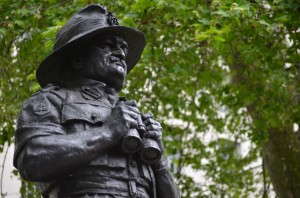Until four days ago, I had never been to London. What I knew about it came from movies, textbooks, and American stereotypes of plucky/prim/proper Brits. I mention this as a sort of disclaimer. I’ve only been here a few days, so there’s a distinct possibility that my impression of how London remembers WWII is superficial. I also haven’t talked to any actual Londoners about the War, so my conclusions come more from what I’ve seen of the city than anything else. Anyway, here it is.
From what I can tell, London and its people wear their battle scars proudly. Between incessant German bombing, rationing, and loss of life in combat, Londoners collectively endured years of psychological and physical terror. I’m sure a lesser group of people would rather forget the trauma of years of war and move on with life. But I don’t think London wants to forget. Everywhere you look, there’s something to memorialize the war. On Whitehall, near Parliament, there is a statue of Bernard Montgomery, the famed British Marshall and second-in-command to Eisenhower. Just up the road from Monty is a sculpture of William Slim, KG, GCB, GCMG, GCVO, GBE, DSO, MC, KStJ (his full honors are just too great not to include), who led British Commonwealth troops against the Japanese in the China-Burma-India campaign. And across the street from Slim is a monument to the women who served in WWII.
But wait, there’s more! London houses the Imperial War Museum (which is, quite upsettingly, closed until July) AND a bunch of its subsidiaries, including the Churchill War Rooms and the HMS Belfast, which all keep the experience of fighting the War alive. And, of course, there’s my favorite memorial of all: the Royal Air Force Chapel in Westminster Abbey. Even in an ancient church that, for all intents and purposes, has nothing to do with the War, there’s a gigantic stained glass window commemorating the heroics of RAF pilots (as well as a bit of residual bomb damage).
So why all the WWII nostalgia? From an American perspective, this idea of dwelling on the past doesn’t make much sense. But of course we’d think that way. With the exception of Pearl Harbor, the US doesn’t really have any noticeable scars from World War II. I’m talking physical scars here: damage to buildings, structures that used to be there and no longer are, that sort of thing. We just didn’t go through the destruction that our friends in the UK did, and we certainly didn’t have to rebuild our country like they did. We also avoided a lot of the hardship that Londoners did. Sure, we had rationing just like everyone else. But by the end of the War, our economy was booming, and Americans were living in relative comfort. Meanwhile, an ocean away, Londoners came out of the war with an utterly exhausted economy and a population that hadn’t seen any sort of basic comfort in years. London was destitute, and I think that’s hard for a lot of Americans (including me) to picture.
People don’t forget experiences like that easily. Before the US entered the War, Brits had been facing the Nazis on the Western Front on their own. By the War’s end, London had seen bombing, starvation, death, and human suffering on a scale that Americans just hadn’t. But in spite of it all, they hung on. They stuck it out until the very end. And that’s got to be a massive source of pride for them. For a while, they were the sole defenders of democracy, and even if it meant forgoing food and burrowing underground for a while, by God, they were going to defend it if it was the last thing they ever did.
So even in this metropolitan, multicultural, and modern city, you still see tons of little memorials to the War. And I love that. I love that these people (it seems, anyway) actively remember their past, and that it still influences the way they think and feel. Londoners certainly don’t spend all their time reminiscing about the glory days of the War, but in their own reserved way, they’re keeping it alive. And in a world still full of bigots and intolerant people, I don’t think it hurts to have a few people around who remember their fight against hate and tyranny. After all, remembering is the only way to keep it from happening again.

